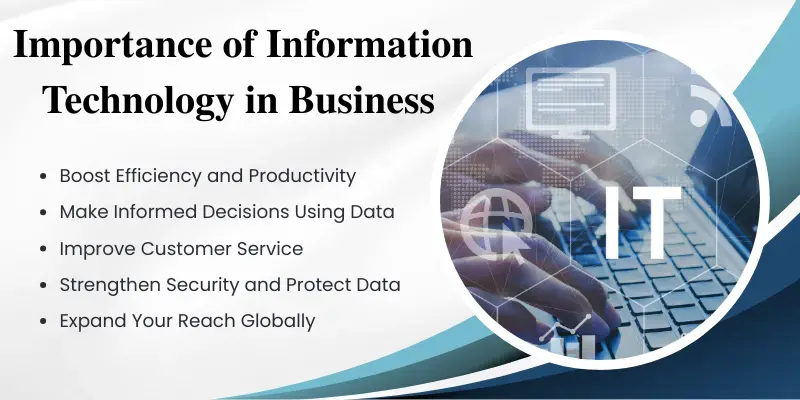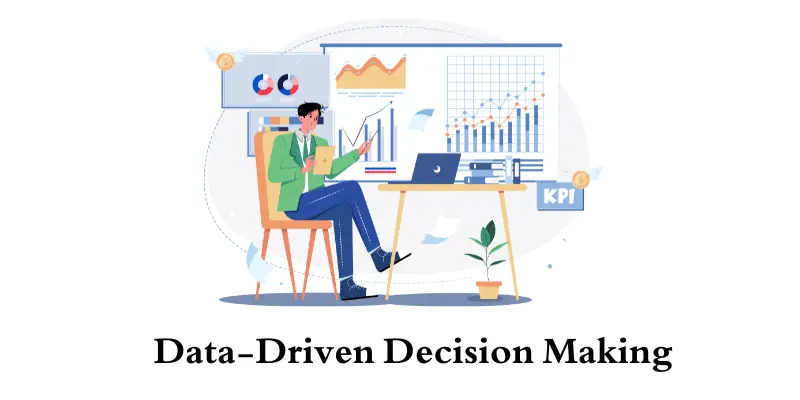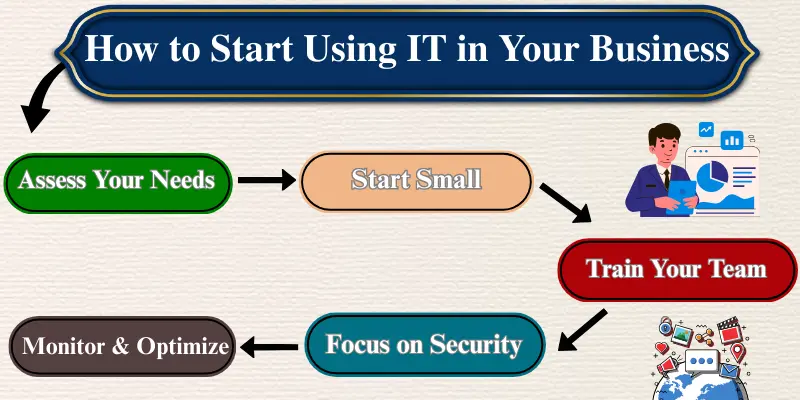Importance of Information Technology in Business Today
Published: 23/Sep/2025
In today’s fast-paced and interconnected world, businesses are increasingly turning to Information Technology (IT) to gain a competitive edge, streamline operations, and enhance customer experience. Whether you are a small startup or a large corporation, the importance of information technology in business cannot be overlooked. IT plays a central role in business growth, offering tools that improve efficiency, communication, decision-making, and security.
In this article, we will explore how IT impacts businesses, the key benefits it offers, and practical steps you can take to implement IT solutions to enhance your business operations. So let’s dive in.
What is IT in Business?
Information Technology in business refers to the use of computers, software, networks, and other digital tools to manage and process business data. From cloud computing and data storage to customer relationship management (CRM) systems and enterprise resource planning (ERP) software, IT helps businesses run efficiently, make informed decisions, and stay connected to their customers.
In simple terms, IT in business includes tools for managing data, communication, and security. It helps businesses automate tasks, improve workflows, and grow—leading to greater success.
Why is IT Important in Business? 10 Key Benefits
IT has become an essential tool for businesses in every industry. Here’s how IT benefits businesses:

1. Boost Efficiency and Productivity with IT
IT systems help improve daily operations by automating routine tasks. By automating processes like payroll, data entry, and inventory management, companies can save valuable time and reduce human error. This frees up employees to focus on more strategic work, increasing overall productivity. For example, cloud-based inventory systems allow real-time tracking and management, improving accuracy and minimizing shortages.
2. Enhance Communication and Collaboration with IT
With the rise of remote work and global teams, effective communication has become more crucial. IT tools like email, video conferencing (Zoom, Microsoft Teams), and project management software (Trello, Asana) help teams stay connected, regardless of location.
These tools allow seamless collaboration, messaging, file sharing, and real-time project tracking, ensuring all members are aligned, leading to faster decision-making and problem-solving.
3. Make Informed Decisions Using Data
In the digital age, data is key. IT systems like business intelligence (BI) tools and data analytics platforms help businesses collect, analyze, and interpret data for better decision-making. For example, analyzing customer behaviours or sales trends allows businesses to optimize marketing, inventory, and product development. Tools like Google Analytics and Salesforce offer insights to target the right audience at the right time.

4. Improve Customer Service with IT Solutions
Excellent customer service is essential for business success, and IT tools enhance this in many ways. CRM systems like Salesforce and HubSpot help businesses manage interactions, track feedback, and personalize experiences. AI-powered chatbots provide 24/7 assistance, handling common inquiries and reducing response time, improving customer satisfaction.
You May Also Like This Post
➡️ Types of Digital Technology: Examples, Applications, & Benefits
5. Strengthen Security and Protect Data
As cyber threats increase, businesses must prioritize data security. IT solutions like firewalls, encryption, and cloud backups protect sensitive data from cyber-attacks and theft. Encryption, for example, ensures customer data remains secure during transactions.

6. Expand Your Reach Globally with IT
IT allows businesses to reach a global audience through e-commerce platforms, digital marketing, and cloud services. For example, platforms like Shopify and WooCommerce allow businesses to sell globally, while tools like Google Ads and social media help target specific regions, expanding reach beyond geographic limits.
7. Cut Costs and Optimize Resources with IT
IT solutions reduce operational costs by automating tasks and improving workflows. Cloud computing eliminates the need for costly on-premise servers, while ERP systems like SAP optimize inventory, track spending, and improve forecasting. Data analysis also helps identify inefficiencies, leading to better resource management and cost savings.
8. Scale Your Business Easily with IT
As your business grows, IT tools like cloud-based solutions (AWS, Google Cloud) provide expandable storage and computing power, allowing expansion without large upfront investments. This flexibility is crucial for startups and small businesses needing cost-effective solutions as they grow.

9. Drive Innovation and Stay Competitive
In a competitive marketplace, innovation is key. IT allows businesses to adopt emerging technologies such as artificial intelligence (AI), machine learning, and the Internet of Things (IoT) to stay ahead of the competition. By integrating these technologies, businesses can streamline operations, enhance customer experiences, and create new revenue streams.
10. Ensure Compliance and Legal Protection with IT
IT systems help businesses comply with regulations like GDPR, HIPAA, and PCI DSS by securely managing data, tracking changes, and automating processes to meet legal requirements.
You May Also Like This Post
➡️ Advantages and Disadvantages of Technology in Agriculture
Real-Life Examples and Case Studies
To show the power of IT in business, let’s look at a few real-world examples of companies using technology to drive success and innovation:
Amazon
Amazon is a prime example of how IT can drive business success. The company uses AI and machine learning to predict consumer behaviour and optimize its supply chain. With cloud computing through AWS, Amazon generated $45.37 billion in revenue in 2020, showcasing the huge financial impact of IT adoption.
Netflix
Netflix uses big data to personalize recommendations for users, increasing engagement and retention. Their IT infrastructure supports smooth streaming to over 200 million subscribers globally, enhancing customer satisfaction and watch time.
Local Retailers
Even small businesses can benefit. A local retailer that adopted Salesforce CRM saw a 25% increase in customer retention in just six months. By automating follow-ups and tracking customer preferences, the retailer boosted sales and strengthened customer loyalty.
How to Start Using IT in Your Business
Adopting IT solutions does not have to be difficult. Here are some simple steps to get started:

- Assess Your Needs: Identify areas where IT can help, such as improving communication, managing customer relationships, or analyzing data.
- Start Small: Begin with easy-to-use, cost-effective tools like Google Workspace, Trello, and Slack, which are scalable for businesses of all sizes.
- Train Your Team: Make sure your team is comfortable with the new tools. Offer training and resources to help them adapt quickly.
- Focus on Security: Invest in cybersecurity tools like firewalls, antivirus software, and data encryption to protect your business.
- Monitor and Optimize: Regularly assess the effectiveness of your IT systems and make necessary adjustments to align with your business goals.
Conclusion
So guys, in this article, we’ve covered the importance of information technology in business in detail. As businesses continue to evolve, implementing the right IT solutions will give you a competitive edge and improve your operations.
My personal recommendation is to start by identifying the areas where IT can make the biggest impact, whether it’s improving communication, enhancing security, or automating processes.
Don’t wait—take the first step today and explore the IT tools that can help your business grow in the digital age!
Frequently Asked Questions
Below are answers to some common questions about the Importance of IT in business:
Start with basic tools that address your immediate needs, like Google Workspace for collaboration, Trello for project management, and Slack for communication. These tools are user-friendly and scalable, making them perfect for businesses of all sizes. As your business grows, you can add more advanced tools like CRM systems and ERP software.
Cloud computing allows businesses to store and access data remotely, reducing the need for expensive on-premise servers. It also offers flexibility, scalability, and better data security.
IT enhances customer service through tools like CRM systems and AI-powered chatbots. CRM systems help businesses track customer interactions and personalize their service. Chatbots provide instant, 24/7 assistance, reducing response time and increasing customer satisfaction.
ICT (Information and Communication Technology) offers several benefits that help businesses grow and stay competitive. Here are 10 key benefits of ICT in business:
- Improved Efficiency
- Cost Reduction
- Better Communication
- Data-Driven Decisions
- Customer Satisfaction
- Reaching a Larger Audience
- Protecting Your Business
- Growing Without Limits
- Staying Ahead with New Ideas
- Ensure Compliance and Legal Protection
ICT (Information and Communication Technology) refers to the use of digital tools like computers, software, and networks to manage and exchange information. It helps businesses improve efficiency, communication, and decision-making. ICT is key to automating processes and connecting with customers.





